Over the last year, I have heard from a number of people, especially church leaders, asking about recommended resources to help them think wisely about the role of technology in our society. On the heels of the release of major generative AI systems like ChatGPT, the ongoing questions over kids’ online safety, and debates over nature and purpose of digital privacy, there are major questions that we need to prepare ourselves to think about in light of the Christian ethic.
Whether you are a church leader thinking about leading a class on these topics, small group leader having conversations with your group, or an interested individual hoping to gain a greater understanding of the formative power of these tools in your own life, these books and resources will aid you in cultivating a deeper sense of wisdom for our digital age.
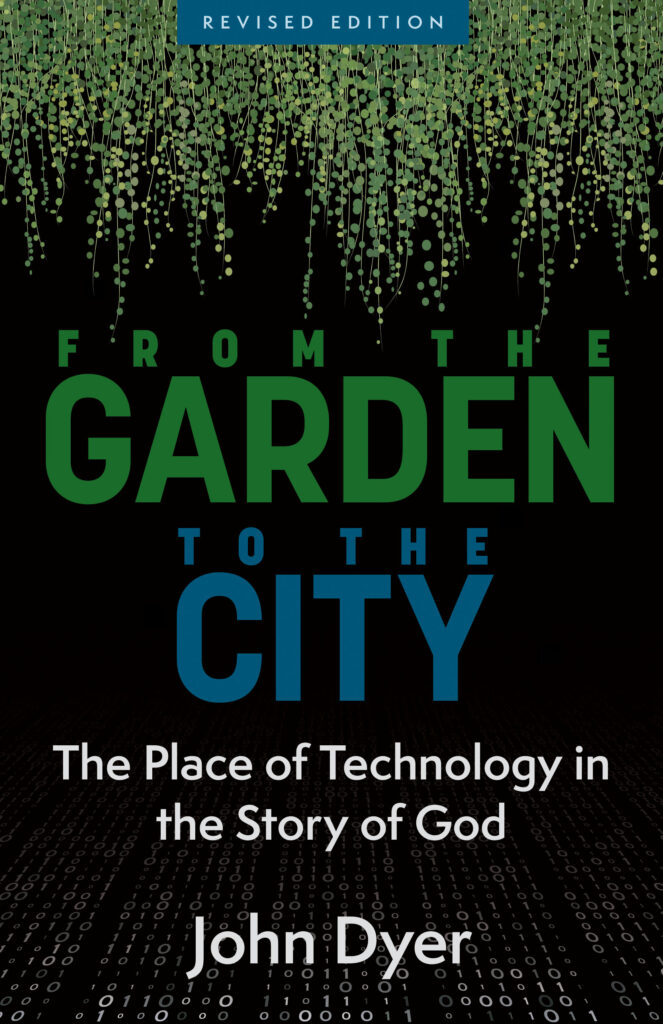
From the Garden to the City: The Place of Technology in the Story of God, Revised Edition
By John Dyer · 2022
This new edition of From the Garden to the City is a welcomed addition to ongoing theological and ethical conversations about how these tools radically alter and reshape every aspect of our society. John Dyer is a skilled, balanced, and hopeful guide who combines his many years of experience on both the technical and philosophical aspects of these important debates. This book will introduce you to some of the major concepts and ideas in the relationship of technology and society that will help you push past simplistic notions of technology as merely a neutral tool. Not only will you better understand the nature of technology, but you will also see how it is shaping how you view God, yourself, and the world around you — both for good and ill. Make sure to check out the conversation I hosted with John on the Digital Public Square podcast about his works.
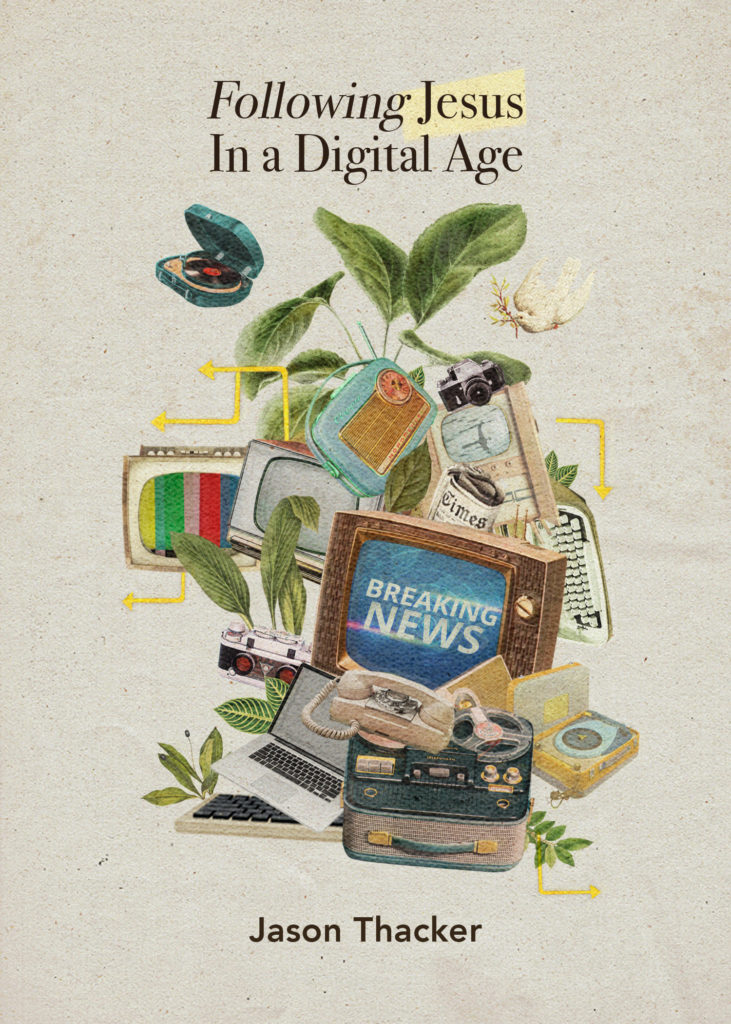
Following Jesus in a Digital Age
By Jason Thacker · 2022
It feels a bit weird to recommend your own book, but I wrote this book exactly for this purpose of equipping you to cultivate wisdom as we all seek to follow Jesus in our digital age. We were told technology would make our lives easier and more convenient, but technology just seems to have made it more complicated and confusing. As Christians, what does our faith have to do with these pressing issues of life in a digital age? This book will challenge you on how technology is shaping your walk with Christ, but you will also be equipped with biblical wisdom to navigate the most difficult aspects of our digital culture—including the rise of misinformation, conspiracy theories, social media, identity politics, and polarization. Each short chapter has a set of questions to help you apply the concepts you read about to your life and there is a special note to leaders at the end about leading people in our digital age. There is also a corresponding six-session small group study with video interviews available from LifeWay Adults.
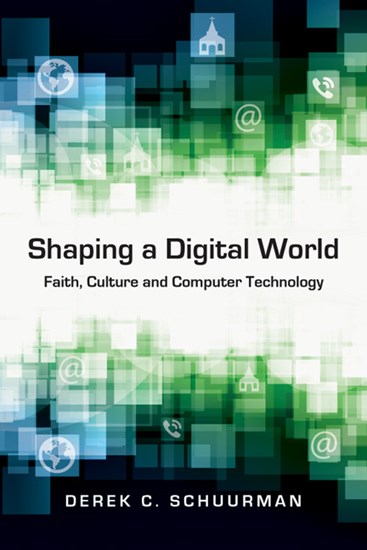
Shaping a Digital World: Faith, Culture and Computer Technology
By Derek C. Schuurman · 2013
This book by Calvin University computer scientist Derek Schuurman is a great next step in going deeper into the debate over the nature and role of technology in the Christian life. Schuurman gives readers a brief theology of technology rooted in the Reformed tradition and connecting it to the contours of the biblical story. Given his background in the field of technology and robust understanding of the theological, philosophical, and ethical issues at stake, this is a unique work that is neither naively optimistic nor overly pessimistic. He also introduces readers to the works of Jacques Ellul, Marshall McLuhan and Neil Postman by putting them in dialogue with some of the major voices in the Christian tradition.
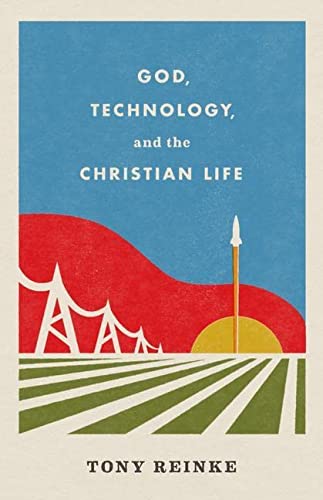
God, Technology, and the Christian Life
By Tony Reinke · 2022
One of the things often lacking in the church’s engagement on these issues is a robust look at the place of technology in the Scriptures. This work by Reinke is a biblical theology of sorts that highlights nine key biblical passages concerning how we can understand technology from a theological perspective. He engages widely with a host of thinkers including John Calvin, Herman Bavinck, Wendell Berry, and leading technologists. He places innovation with the larger biblical narrative of creation and redemption, not simply seeing these tools as a result of the fall. I appreciate his work on helping the Church to retrieve a robust understanding of technology while avoiding much of the dystopian hysteria that is so common in this season. I tend to take a more realist approach to technology, while Tony is a bit more of a tech optimist. If you are interested in hearing Tony and I discuss these ideas, make sure to check out our conversation on the Digital Public Square podcast.
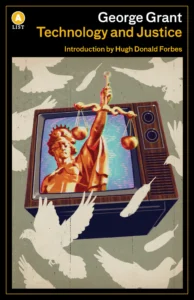
Technology and Justice
By George Grant · 2019
C.S. Lewis once wrote that we often feel too intimidated to read classic works and choose rather to read modern commentaries or reformulations of great texts, but that older works are often much more approachable, enlightening, and valuable as they help us to see past our own blind spots. There is a reason classic works have stood the test of time and not currently “on trial” as many modern books. This is one of the many reasons that I encourage readers to pick some classic works on a philosophy of technology like this one by the Canadian philosopher George Grant. He famously wrote in this volume that we all tend to believe that “more technology is needed to meet the emergencies which technology has produced.” This insight helps to reframe how we often seek technical solutions to the problems we face rather than slowing down to ask the hard questions of “should we” rather than simply “can we.” You may not end up agreeing with every aspect of Grant’s interpretation of our technological moment, but you will nevertheless walk away with a greater appreciation for and understanding of the myriad of ways that technology shapes us people.
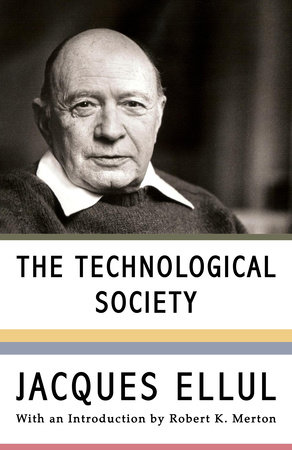
The Technological Society
By Jacques Ellul · 1964
One of the most influential books on these topics in my life is The Technological Society by the French sociologist and Protestant theologian Jacques Ellul. His presentation of what technology actually is helps to shake us from a faulty understanding of technology as merely value neutral tools to see the widespread effects of how various techniques are distinctly, yet subtly shaping our perspective of the world around us. Be aware that Ellul’s philosophy of technology can be overly deterministic at times which I unpack in one of my contributions to The Digital Public Square, but this long and at times dense work is well worth the investment. It is a classic in the field and a highly influential account of the nature and scope of technological change. Similar to Grant, you may well disagree with Ellul at many points in his argument (as I do) yet you will undoubtedly benefit from his thought provoking analysis of our modern era. This is a work I highly encourage you to grab as an ebook, audiobook, or even the original hardback edition as the paperback is nearly unreadable given the format and layout.
The Rundown
OpenAI leaders call for regulation to prevent AI destroying humanity by Alex Hern | The Guardian
The leaders of the ChatGPT developer OpenAI have called for the regulation of “superintelligent” AIs, arguing that an equivalent to the International Atomic Energy Agency is needed to protect humanity from the risk of accidentally creating something with the power to destroy it.
Surgeon general issues advisory about social media risks for kids by Tina Reed | Axios
U.S. Surgeon General Vivek Murthy issuing a warning today that social media poses a threat to kids’ mental health, escalating calls for new safeguards aimed at minors. The advisory adds to scrutiny over the effects of excessive use and harmful content, which has been blamed for consequences ranging from disrupting kids’ sleep to promoting suicidal thoughts.
Baptists and the Neo-Calvinist Tradition by Dennis Greeson | Bible Mesh
I am honored to have been invited to share some reflections on Dr. Wolters’ legacy. I have been asked to share some thoughts on what his work, and the Neo-Calvinist tradition more broadly, has meant to Baptists.
Podcast: Technology Isn’t a Neutral Tool with Jason Thacker and Dru Johnson | The Biblical Mind
From social media, to the printing press, to artificial intelligence, to the pencil, technologies have often been regarded as things that can’t be good or bad apart from how people choose to use them.
Confucianism for robots? Ethicist says that’s better than giving them full rights by Connie Lin | Fast Company
Over the past months, generative AI tools like ChatGPT have jolted the public into a state of techno-fiction on steroids, while career professionals who endured years of schooling to become doctors, lawyers, and computer programmers have sweated over the prospect of job cannibalization.
Revised immigration bill has bipartisan support by Tom Strode | Baptist Press
The Southern Baptist Convention’s ethics entity expressed hope new bipartisan legislation will translate into a focused endeavor to reform at last the United States’ immigration system. The Ethics & Religious Liberty Commission (ERLC) welcomed introduction Tuesday (May 23) of the Dignity Act. The bill, first offered last year, gained reintroduction by Rep. Maria Salazar, R-Fla., with co-sponsorship this time from Rep. Veronica Escobar, D-Texas, and other Democrats as well as Republicans.